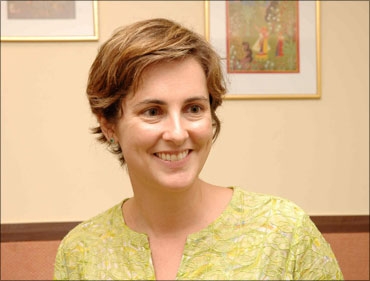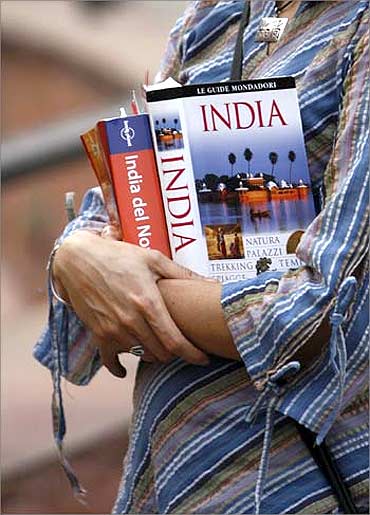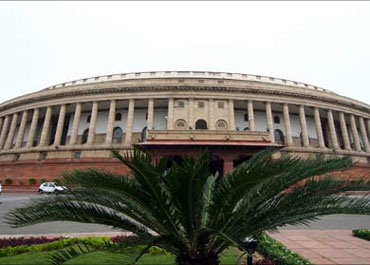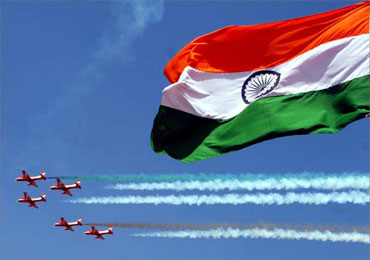
Chennai-based Jessica Seddon Wallack is a professor at the Institute for Financial and Management Research and the Director of the Centre for Development Finance at the Institute of Financial and Management Research (IFMR).
She did her B.A. from Harvard University and her PhD from Stanford University Graduate School of Business. She has been studying development economics and politics, for the last decade-and-a-half, and India, for nearly a decade.
In this exclusive interview with Rediff.com, she talks about India.
Have the way you looked at India, its economy and its problems changed after you came over here?
Yes, my perspective changed after I moved here three-and-a-half years ago. I moved here to experience the things I studied and to work more closely with some of the people involved in the institutions and policies that I was, from an academic point of view, theorising about.
One of my first papers on India, for example, was on the Electricity Reform Act. When I moved here, I experienced electricity in action, without the buffer of the backup generator that I had always had when I just came here to visit.
I stood in line to pay the bill, spoke to other consumers, read the local notices of demand interruption, and saw the transformer near my first house explode in sparks.
. . .

I also spoke to some of the workers, and this gave me a whole new perspective on the electricity distribution, something I had thought about as an abstract service.
Similarly, I came to understand many things like the importance of borewells and the political economy of water.
It's one thing to talk about how low the price of water could be with efficient privately operated municipal systems, even with cost-recovering user charges, it's quite another thing to see the investments that people have made in gaining water in the absence of such systems and understand that these would also have to be compensated.
Personal experiences also brought home the extent of the problem -- one time a friend, who happened to be quite an important official, cancelled lunch with me because she had to be home for water to be delivered!
I had also studied transport, but I only got the pedestrian experience after I moved here and spent a lot of time walking on the streets.
So moving here brought me face to face with the 'infrastructure challenges' I had covered in my early work on India.
But it also made me understand the variety of solutions that people come up with and to see the creativity with which people tackle just the everyday challenges of getting things done.
This creativity is what makes me really optimistic about India. Not immediately, because right now this creativity is directed toward solving problems that they really don't need to be facing, but in the long run, when this 'practice' gets directed to new and bigger and still unsolved problems, that's when India will take off.
. . .

How did you get interested in India?
The interest in India came out of the interest in the more general development topics.
I used to study Latin America and had spent a lot of time there. When I was in graduate school, I had an Indian mentor, Professor T N Srinivasan, who was visiting Stanford from Yale.
He looked at some of my work on Latin America and said, "You really need to look at India. It's a lot more interesting." I was also working for him as a research assistant, so I had to listen to him.
The more I read then, the more interested I became. We ended up editing a book together, writing several articles, and are even now in the middle of writing a paper together.
Stanford has an annual conference on Indian economic development, and a lot of Indian policymakers used to come there. So I got to meet a lot of very interesting policymakers and interact with them informally and ask a lot of questions. I still ask them a lot of questions!
Slowly I started visiting India. I had more projects here and I was travelling here frequently, so it made sense to move here.
It was supposed to be for a year, but has been three-and-a-half years now. One thing led to another and now I find myself here.
You wrote a book on federalism with T N Srinivasan. How do you look at federalism from India's point of view?
I think it is the only system that will work in India.
It is quite centralised in the sense that most of the money ends up with the union government before it is transferred to states, but the fact that states have their own right to make policies on some subjects, are their own political spheres, and have constitutional standing means that more variety can be accommodated without stretching the system too much.
. . .

But there are continuous problems between various states and the Centre. . .
There are definitely challenges managing the collection of states, but it is unusual and incredibly impressive that India has remained one country. I think a lot of that has to do with the flexibility of federalism.
Of course, one of the weaknesses now is the absence of a real platform for serious discussion between the Centre and the states. These kinds of discussions used to take place within a single party, now there is more room for opposition between Centre and states when state parties came in power in the states and in the central government.
There are a lot of institutions out there -- NDC, ISC, etc, even Parliament to some extent -- but strengthening these is a big challenge for India.
A lot of policies have been slowed down because of Centre-state problems. Electricity reforms are a key example. Dealing with water will be another big issue. We do see major challenges but the system of federalism can work.
. . .

From an economist's point of view, how do you look at globalisation? How good is the globalised economy for countries?
I think globalisation right now is uneven. It creates a flat world, but the flat world has a lot of 'potholes' and the contrast highlights the problems and inequalities.
Globalisation is neither inherently good nor bad for a country; its effect really depends on how it interacts with the country's own setup. It opens up opportunities, and who benefits depends on who has access.
If the country has a political process or an internal economic process that can relieve inequalities, more people can benefit from globalisation. If that process is lacking, obviously these problems are going to remain or even get worse.
The gap between the rich and the poor is widening in India . . .
In most countries, opening up of the economy means the gap between the rich and the poor within that country has widened. The opportunities for everybody have increased, but it is up to the country to ensure that it has the educational infrastructure and social safety net in place so that everybody can make use of the opportunities.
This would be kind of a big shift -- right now I think many people look to the government to provide things, to provide opportunities. It can't, and it probably won't.
The reality is that the opportunities are there outside the government, and will continue to be created faster outside the government, but the government has the responsibility of making sure people are ready and able to seize them. It needs to become better at being an enabler, and not get stuck in being an inept provider.
. . .

When there is more cut-throat competition, do you feel the less-abled are left out in society?
Right now, unfortunately, it's not just the less-abled, but also the less-advantaged who are left out. The bright kids who can't afford to go to school, the kids who are pulled out early to work, for example -- that's not ability, that's advantage, and the competition exposes this problem.
So I think there are really two big priorities -- first, to narrow things down so that only the less-abled are really left out, and then to figure out ways to support them.
In such a globalised society, what will be the role of the State? If you take Kerala, for example, there was a time when it had an excellent system for education and healthcare. Not any more.
It is interesting, you raised education and healthcare. Both are de facto privatised without any real policy plan behind that outcome. And that's not good.
It's happening because people are putting money in private services when public services fail, not because there is some kind of thought about how private can complement public or something like that.
I think something like 70% of India's healthcare spending goes for private care: compare that to the income and anyone would say that the State is not doing enough to provide a basic safety net in healthcare.
Similarly, looking at the sacrifices people make to send their kids to private schools and tuitions. That shouldn't have to happen. Public school is a good investment, one of the best. And by all accounts it's not happening.
. . .

Do you think the countries responsible for the economic recession have learnt any lesson?
I don't think anybody has learnt any lesson. The US needs to learn the lesson that we overspend, for example, but we continue to spend beyond our means.
We have the habit of talking about more innovation, more green tech, more ways to get out of the debt, but nothing happens.
In the case of India, my concern, which is shared by other economists, is that the recession made it easy to blame the slowdown on a global recession rather than reaching capacity constraints, infrastructure and human resources limitations.
Unfortunately, the level of congestion on the roads, inadequacy of power supply, skills deficit in the labour market are all put on the backburner, even though these were all contributing to the slowdown if you look at the numbers and the timing of the slowdown closely.
Do you see a shift in economic power from the West to East -- to Asia?
Yes, of course, when you look at the size of the economies involved and their likely growth rates. But what I think is more interesting is the way that the intertwining of business and diplomacy is becoming more universal, more spread out across the world.
The rise of Indian and Chinese companies on the global stage, and the way that these countries' policies and international outreach efforts are in turn shaped by the interests of these companies is very interesting.
In the past, perhaps, companies in the developing world may have focussed on getting governments to protect their interests from globalisation; now, it's more a matter of asking their governments' diplomacy to support their foray into global activities. I think this creates competition for what's been kind of a long-standing reality in the developed world.
. . .

How interlinked are politics and economics?
Very. But economics in some ways thrives on politics. There is a big debate going on about whether countries grow faster under dictatorship. My bias is that dictatorship cannot work and only democracies where flow of information takes place, work in the long run.
There are many who say that China is growing faster because of dictatorship and India cannot catch up with it because of democracy...
I would put both money and opinion behind India in the long run mainly because in China there is no feedback coming from small businesses and people who are trying to make a living and collectively adding up the GDP.
In India, on the other hand, there is an incredible amount of decentralised knowledge of what needs to be done and how that can be conveyed back into policy. That is where India's strength is.
You were a consultant with the World Bank on Poverty Reduction and Economic Management, How do you look at India's poverty where 300 million people are living below the poverty line?
When I say that's a massive challenge, it's the understatement of the year. Terminologies like Incredible India, emerging giant, et cetera sometimes hide the reality that many of the social and health indicators are abysmal and embarrassing.
These are some of the issues that will come back and constrain India from fully emerging. It is going to be a giant, it is a giant, but whether it is going to be the global presence it aspires to be or just a plain giant is the question.
It all depends on health, education and investment on people, especially those who are at the bottom.
Would you connect Naxalism and Maoism to globalisation and the rich poor divide?
Many would say Maoism and Naxalism are a result of failure to provide development.
Failure of the State?
It is easy to look for somebody to blame. I said earlier that the role of the government is not to provide everything but be an enabler.
. . .

So, you will not use the phrase 'failure of the State'?
I think it is several failures: failure of the State to provide infrastructure for opportunities, provide basic public health, provide an education system that enables people to make use of opportunities. It is also a failure to provide access to the democratic process.
Is that linked to globalisation? Like I said, globalisation creates opportunities, but some people take advantage of it, and some don't, and some can't. That will create inequality.
That is not because of globalisation. That is because of the domestic policy interacting with globalisation.
I must say I am not an expert on social movements or domestic terrorism or even what label to apply to the phenomenon. But it is hard to link Naxalism just to globalisation.
Recently you wrote a column on caste being included in the census. As an outsider, how do you look at the caste system in India? According to you, where will it lead to if caste is included in the census?
If we could get valid, accurate information on caste, it could revolutionise a public debate by surprising people. In the United States, we have race included in the census. It is not as complex as caste, but it is fairly divisive and a similar type of an issue.
There are surprises that come from the data because race is included in the census. The data present a new picture of society in the degree of integration or the lack of it.
A think tank studying the census data, for example, found that nearly 15% of the marriages in the US are inter-marriages between different ethnic groups, higher than any time before.
Knowing this gives a new picture of trends in integration, and has arguably been something encouraging to those dealing with decisions like this in their private life, to know that there are a lot of others like them.
So, if we had good data and if the community of academics analysed it properly, we could get a very interesting and correct picture of what is happening. The concerns that the data will be heavily politicised ignores the power and the responsibility of the academic research community.
It's harder to manipulate information if many people have access to it. It is better to record it and give people something to analyse and argue about.
But this is a big 'if', and I think we need to be very careful to set up the process to get good data, or at least data that is very transparently collected so that we can have a discussion about its flaws and adjust our conclusions.